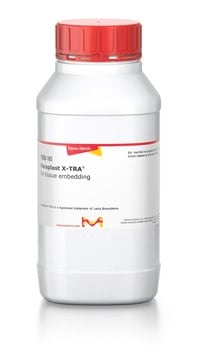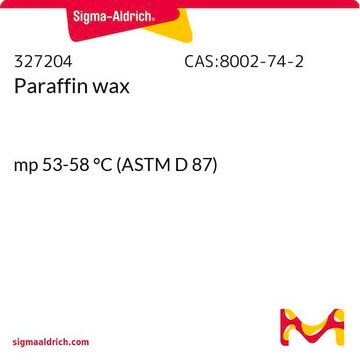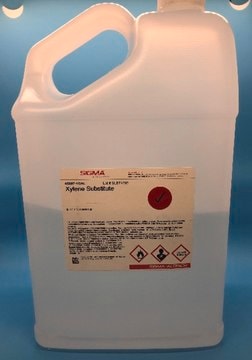76258
Paraplast Plus®
suitable for electron microscopy, pellets (fast-melting)
Synonym(s):
Paraffin – polyisobutylene mixture
Sign Into View Organizational & Contract Pricing
All Photos(1)
About This Item
Recommended Products
form
pellets (fast-melting)
technique(s)
electron microscopy: suitable
thickness
≤1 μm , short ribbons
≤2 μm , sectioning: continuous ribbons
mp
56-57 °C
application(s)
hematology
histology
storage temp.
2-8°C
General description
regular Paraplast with approx. 0.8% DMSO added for enhanced ease of infiltration and sectioning
Application
Paraffin polyisobutylene mixture is a tissue embedding medium composed of highly purified paraffin and polyisobutylene and a low level of dimethyl sulfoxide (DMSO) to enhance the rate of tissue penetration. Paraffin-polyisobutylene (76258) supports thin wrinkle-free sectioning down to 4 microM with more flexible and continuous ribbons.
Legal Information
Paraplast Plus is a registered trademark of Leica Biosystems
Storage Class Code
11 - Combustible Solids
WGK
WGK 2
Flash Point(F)
Not applicable
Flash Point(C)
Not applicable
Personal Protective Equipment
dust mask type N95 (US), Eyeshields, Gloves
Certificates of Analysis (COA)
Search for Certificates of Analysis (COA) by entering the products Lot/Batch Number. Lot and Batch Numbers can be found on a product’s label following the words ‘Lot’ or ‘Batch’.
Already Own This Product?
Find documentation for the products that you have recently purchased in the Document Library.
Ewa Urbańczyk-Wochniak et al.
Cellular & molecular biology letters, 7(1), 7-18 (2002-04-11)
This study describes an effective method of in situ RT-PCR (RT-ISPCR) that was developed to localize gene expression in plant tissues. This RT-PCR technique was performed on sectioned tissues of female buds of the cucumber GY3 inbred line. The CUS1
H O Goyal et al.
The Anatomical record, 250(2), 164-171 (1998-03-07)
Since androgens and/or estrogens must bind with specific receptors in order to elicit a response at the target organ(s), it is important to understand factors that regulate expression of androgen receptors (AR) and estrogen receptors (ER). Hence, the objective of
Ye Jin et al.
The Plant cell, 21(7), 2072-2089 (2009-07-04)
Invertase plays multiple pivotal roles in plant development. Thus, its activity must be tightly regulated in vivo. Emerging evidence suggests that a group of small proteins that inhibit invertase activity in vitro appears to exist in a wide variety of
R S Liem et al.
Acta anatomica, 132(2), 164-168 (1988-01-01)
A method is described for the histochemical detection of horseradish peroxidase in Paraplast Plus embedded brain sections. The procedure uses 150-micron-thick Vibratome-cut slices of glutaraldehyde-paraformaldehyde-fixed brain tissue. Tetramethylbenzidine stabilized by diaminobenzidine/cobalt/H2O2 is used as chromogen. The Vibratome-cut slices are dehydrated
H O Goyal et al.
The Anatomical record, 249(1), 54-62 (1997-09-19)
Because of the significance of androgens and estrogens in prenatal and postanatal differentiation of the testis and excurrent ducts, it is important to understand the developmental pattern of androgen receptor (AR) and estrogen receptor (ER) in these organs. Tissues from
Our team of scientists has experience in all areas of research including Life Science, Material Science, Chemical Synthesis, Chromatography, Analytical and many others.
Contact Technical Service








